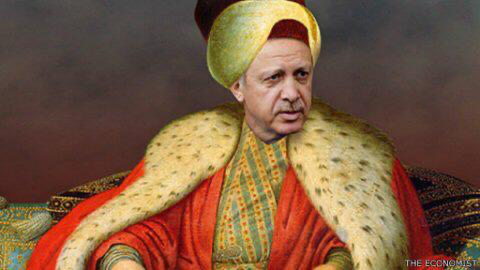Turkey has placed itself in a strategic dilemma on all sides since it has become at odds with its neighbours in the Middle East, the Balkans, the Caucasus and its allies, in addition to a potential conflict with Russia and Iran over conflicts of interests.
After 2011, Turkey turned its back on the “Zero Problems” policy, and its actions brought about panic and discontent among its allies, who sought to expel the NATO-country from the military alliance, describing Turkey as an “unreliable ally that pursues its interests selfishly.”
All these conflicts have raised questions about the contradictory nature of Turkish foreign policy: what does Turkey want?
Many political analysts simply say that during Erdogan’s era, Turkish foreign policy embraced the dream of the neo-Ottomans that aimed at restoring the glory of the outdated empire and forming a new identity for Turkey on the basis of religious belief, which may lead to irreversible damage within the Turkish society.
Unlike Mustafa Kemal Ataturk, the father of the modern Turkish Republic, Erdogan wants to boost nationalism and the role of Islam in the Turkish state-structure after decades of secularism.
For this purpose, he has focused on the importance of Ottoman history in his speeches and increased religious education in state schools, that have turned into “Imam Hatip” schools. These schools are religious secondary education institutions that do not only produce preachers (religious clerics) but also cultivate religious sentiment in their students.
Other critics argued that what is going on in Turkey is not unique and that most people around the world long for the past. They call this movement a policy of nostalgia that ties itself to “memory, not history.”
However, the Western-backed Arab Spring, led by the United States, provided a valuable opportunity for Erdogan, who tried not to waste it and, of course, he didn’t hesitate to risk everything to follow his dream to become the Sultan of the new Islamic world he wants to create.
The turmoil of 2011 that engulfed the Arab countries was good chance to reconstruct the Ottoman Empire. As a result, he rushed to provide support to terrorist organizations such as the Muslim Brotherhood and ISIS, which embraced the nostalgic ideology. He has also worked so hard to install them in the countries that Ottomans once occupied such as Syria, Libya, Egypt, Bosnia and Chechnya under the pretext of supporting freedom.
For instance, he supported the former president of Egypt Mohamed Morsi (who was democratically elected and later on toppled due to his extremist policies) An Islamist affiliated with the Muslim Brotherhood organisation – and he is still sending Syrian mercenaries to fight in Libya spreading chaos and death in the devastated country.
In June 2019, Erdogan held a funeral prayer in Istanbul’s ancient Fatih mosque in honour of Morsi, who died during his trial and, of course, he made an impassioned speech glorifying his onetime ally.
Many videos that made a fuss on social media showed how Turkey sent al-Nusra Front fighters (al-Qaeda linked jihadist group in Syria) to fight as mercenaries in Libya. They are the same fighters who fought the Syrian Arab Army in Idlib and were praised by the Western mainstream media as “moderate rebels” during the Syrian crisis.
Erdogan’s controversially ostentatious character also appeared during the visit of German chancellor Angela Merkel to Istanbul, as photos showed opulent and gilded chairs surrounded by gold. At the time, Social media comments came fast: The Sultan of Turkey on his throne.
Erdogan has staked his reputation, his relationship with his allies and the lives of Turkey’s soldiers, and he is still willing to take the risk for the sake of his illusory sense of Power.
Over the course of Erdogan’s rise to power, Turkey appears to be burning bridges with both allies and opponents and giving signals that it wants to play hard with an increasing number of adversaries.
The truth is that it was always only a matter of time before Erdogan halts “zero problems” policy.
Emma Abbas

